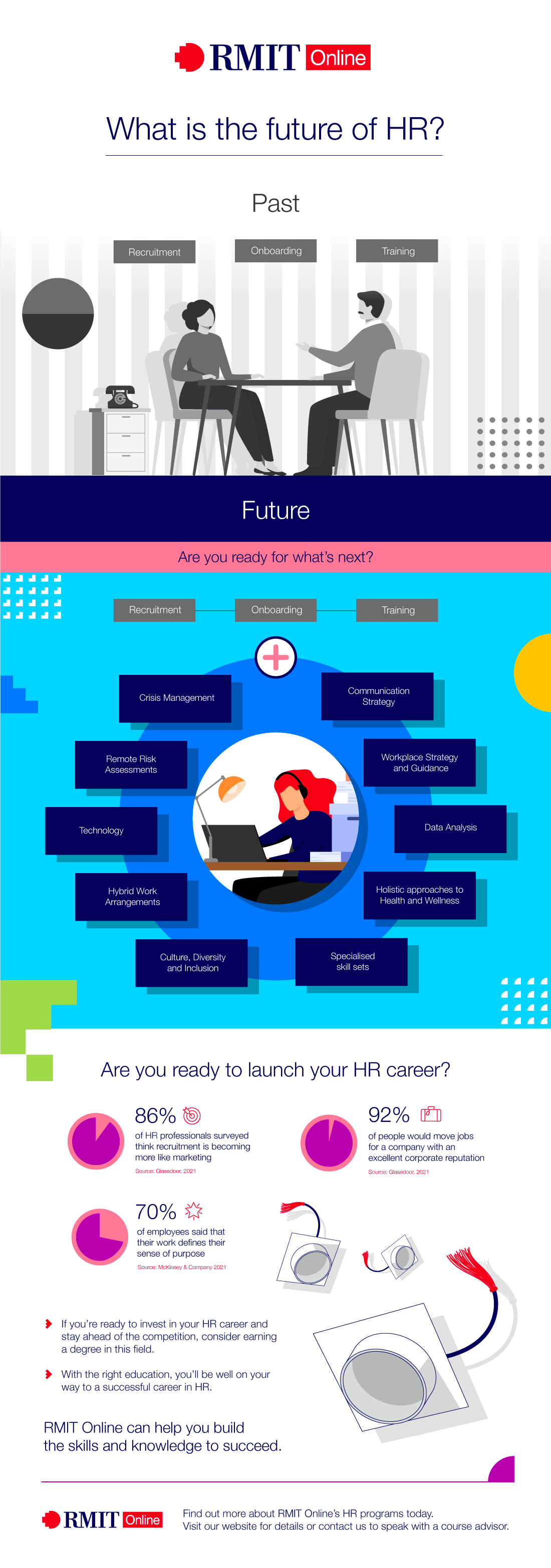What is HR today and what does the future hold for the industry?

If you’ve ever been employed, chances are you’ve been in touch with human resources (HR). In small companies, this is often just the owner of the business. In larger companies, you’ll find there are varying degrees of HR positions on offer.
A common misconception of human resources is that it’s just about hiring and firing. In reality, it starts when a position is imagined and follows the process to bring this role to fruition by resourcing and planning. The HR professional will then support the employee through their life-cycle at work, until their final day.
As an HR professional, you're responsible for supporting the most important part of a business – your people.
This article will explore everything you need to know about being a successful HR professional, from myth-busting the role and its responsibilities to salary expectations, trends in the field and what the future of work looks like for HR.
What is HR?
The first step to understanding what it takes to be a successful HR professional is understanding what HR is. HR stands for ‘Human Resources’, and it’s the department within a company responsible for all things related to people. This includes recruiting new employees, managing employee relations and creating company policies.
What's it like working in HR?
At its core, HR is all about supporting the people in your organisation. This means working with employees at all levels to help them achieve their goals and fulfil their potential. They also play a vital role in everything from talent acquisition and retention to employee development and engagement.
To be successful in HR, you need to be able to wear many hats. You must be part of the strategic decision-making process while also being able to roll up your sleeves and get into the details. You need to communicate effectively with all types of people and must have a strong understanding of the laws and regulations that affect your organisation.
If you’re wondering what it’s like working in HR, here’s what you should expect:
There's no one-size-fits-all career path in HR. Some people start as entry-level recruiters or coordinators, while others move into an HR role from other business areas. Regardless of your background, it’s essential to be open-minded and flexible, as you may need to try out a few different roles before you find the perfect fit.
The best way to learn about HR is through online study and on-the-job training. Studying a Master of Human Resource Management will give you a strong foundation to excel in your HR role, while also giving you the advanced skills to propel your career.
HR is constantly changing, and you need to be prepared to change with it. Like many industries, the future of work in HR is evolving rapidly, and professionals need to be at the forefront of these changes. Whether it’s new legislation or the latest employee engagement trends, you need to stay up to date and adapt your strategies accordingly.

The top three myths about what it’s like to work in HR
There's a lot of misinformation out there about what it means to work in human resources. In fact, many people believe that HR is nothing more than a glorified admin role – and nothing could be further from the truth!
As we progress further into a digital world, the demands of HR professionals are changing and they are the driving force behind building our new work-life balance.
- Myth 1: HR is all about the numbers
One of the most common misconceptions about HR is that its sole focus is on numbers and data. While it's true that HR professionals need to be able to analyse and interpret data, there's much more to the role than just crunching numbers. HR is just as much about people as it is about numbers.
As an HR professional, you'll need to build strong relationships with employees and managers, understand their needs and concerns and resolve conflicts effectively. You'll also need to be a good communicator, both in person and in your writing as a large part of your job will involve communicating with employees and other stakeholders. The future of HR work will require human resource professionals to adapt even more, building strong relationships in virtual environments.
- Myth 2: HR is all about administration
Another common misconception about HR is that it's nothing more than a glorified administrative role. While it's true that HR professionals do have to deal with a lot of paperwork, there's much more to the job than just filing and data entry. HR is responsible for some of the most critical tasks in any business, from hiring and firing to compliance with labour laws.
As an HR professional, you'll need to be well-versed in all aspects of employment law and have a keen eye for detail to spot any potential problems. You'll also need excellent organisation skills to juggle the many different tasks you'll be responsible for. New technology is helping streamline the process, so mastering different software applications will help make your HR role more efficient.
- Myth 3: HR doesn’t lead to career progression
HR is a dynamic and ever-changing field with plenty of opportunities for career advancement.
As an HR professional, you'll have the opportunity to move into management roles, take on specialised positions, such as recruitment or training, or even start your own HR consulting business. With the right skills and experience, the sky's the limit for your career in HR.
Human resources is a complex and diverse field with many different roles and responsibilities. It's not just about crunching numbers or dealing with paperwork – it's also about understanding the people and dynamics that make up a successful business.

How much can I earn as an HR professional?
Salary expectations for HR managers can vary widely, depending on education level and experience. With so many areas to specialise in, nothing stops you from achieving a healthy HR income.
HR professionals with a bachelor's degree make approximately $75,000 per year. Those with an advanced degree or significant experience in the field may earn upwards of $120,000 per year.
Of course, it all depends on your role and seniority within the organisation. The best way to prepare for a successful future working in HR is to strengthen your skills, knowledge and connections through higher education and training. This will enable you to negotiate a higher salary and give you more work opportunities as your career progresses.
HR roles and specialisations
There are many different roles within the HR department, and each one requires specialised skills and knowledge.
HR generalists are responsible for various tasks, including recruiting, onboarding and training new employees. They may also handle employee performance reviews and manage the company’s benefits packages.
HR managers oversee the HR department and all its various functions. They are typically responsible for developing policies, procedures and programs related to HR. Additionally, HR managers may also be responsible for conducting employee investigations and managing conflict resolution.
HR specialists are experts in specific areas of HR, such as compensation and benefits or employee relations. They work closely with HR managers and other employees to ensure that all HR functions are carried out effectively.
HR directors are responsible for managing the overall HR department and its various functions and overseeing all HR employees. They develop and implement policies and procedures related to HR, and they also work closely with senior management to meet the company’s HR needs.
If you're interested in a career in HR, there are many ways to progress through the ranks. This might include taking on additional responsibilities, earning an advanced degree or becoming a certified HR professional.
Regardless of your experience level or the size of the company you work for, there are plenty of growth opportunities within the HR field.
What is the future of work for HR?
The ever-changing HR landscape post COVID-19
The COVID-19 pandemic has fast-tracked our society into hybrid work environments. Roles such as HR, which have been traditionally very people-oriented and personal, are evolving into a virtual landscape.
This means that, since 2020, an HR manager’s role has changed – a lot. They must now learn to manage their employees in different ways, with most workplaces adopting a hybrid work model.
There is also the added HR role of managing COVID-19 requests, policies, regulations and support. Mental health is just as prevalent as physical health, so the right framework needs to be established to build a supportive and positive work culture.
HR professionals also need to be flexible and dynamic in their approach to employee conflict, career progression and support. We’re not only hiring and firing virtually, we’re also managing employees virtually, which brings about its own benefits, but also concerns.
To ensure the future of HR is strong, we need to think strategically about how we look after our employees.
What skills do I need to succeed in HR in the future?
The role of an HR professional has evolved significantly since the pandemic. Employers are looking for more than just people skills and interpersonal skills. Human resources professionals will now need to be trained in:
Crisis management
Working pragmatically when faced with a crisis is imperative in an HR role. As a human resources professional, you need to be the core strength of your business and guide your teams to effective solutions. Keeping calm in times of crisis is critical, as most of the staff, including executive teams, may be looking to you for direction and support.
Communication strategies
One of the great outcomes of living through a global pandemic is learning the importance of communication. HR professionals have had to take a more active role in developing communication strategies, so that staff can work synchronously together and achieve common goals.
Risk assessments
While risk management has always been part of an HR professional’s role, it has amplified significantly post-COVID. Risk assessments are now performed in both the office and home environments, to ensure staff can work safely. There have also been increased risk assessments to manage COVID-positive staff members and reduce the chance of infection.
Managing remote staff
No longer is flexible working arrangements only offered to working parents. As part of the world’s most unexpected workplace and social experiment, the pandemic has taught us that working from home can not only benefit employees, it can also increase productivity. But managing remote staff is not always easy. HR professionals need to have the right skills to support their staff and identify any areas for improvement and achievement.
While the pandemic has brought many challenges, it’s also presented opportunities for HR professionals to demonstrate their strategic thinking and problem-solving skills.
As such, it’s more important than ever for HR professionals to stay up to date with current training, trends and best practices. By doing so, they can position themselves as key players in their organisations.

What is the future of HR?
Past: Recruitment, onboarding, training.
Future: Recruitment, Onboarding, Training
Plus
- Crisis management
- Remote risk assessments
- Technology
- Hybrid work arrangements
- Culture, diversity and inclusion
- Specialised skill sets
- Holistic approaches to health and wellness
- Data analysis
- Workplace strategy and guidance
- Communication strategy
Are you ready to launch your HR career?
- 86% of HR professionals surveyed think recruitment is becoming more like marketing (Source: Glassdoor 2021).
- 92% of people would move jobs for a company with an excellent corporate reputation (Source: Glassdoor 2021).
- 70% of people said that their work defines their sense of purpose (Source: McKinsey & Company 2021).
If you’re ready to invest in your HR career and stay ahead of the competition, consider earning a degree in this field. With the right education, you’ll be well on your way to a successful career in HR. RMIT Online can help you build the skills and knowledge to succeed. Find out more about RMIT Online’s HR programs today.
HR challenges and trends
Whether you're just starting in HR or are looking to take your career to the next level, it's important to be aware of the challenges and trends in the HR field, particularly to future-proof your HR role. This will give you a competitive advantage and help you advance your career.
Five challenges faced by HR management to keep your eye on:
1. Government regulations
Government regulations are a challenge for HR professionals because they must adhere to a variety of legislation that outlines fair practices for businesses and employees. This legislation is constantly evolving, so HR professionals must be vigilant to ensure compliance. The legislation of today, may not necessarily be the legislation of the future.
These government regulations can be complex, so knowing which laws apply in specific situations can be challenging. What’s more, if businesses don’t comply with government regulations, they can face serious consequences, such as hefty fines or even jail time.
2. Economic growth
Human resources professionals are increasingly being called upon to contribute to economic growth in their organisations. While this may seem like a straightforward task, it can be challenging to achieve this goal. A few factors can impact economic growth, and HR professionals must carefully manage all aspects of the workforce to maximise results.
HR professionals may encounter challenges in promoting economic growth, including workforce planning and recruitment, employee training and development, performance management systems and engagement strategies. Plus, they must be prepared to continually monitor changing market conditions to adapt their strategy as needed. This can be made more difficult by hybrid work environments as staff are managed remotely and in-person training sessions can be harder to coordinate.
3. Social issues
Social issues are a challenge for HR professionals because they can directly impact employees and the workplace. These issues can include gender inequality, racial inequality, wage inequality, sexual harassment and occupational stress.
HR professionals need to be aware of these issues and how they affect employees to create an inclusive and equitable workplace. HR professionals can help close the gender pay gap by being aware of issues in diversity and contemporary strategic human resource management.
Moving to a remote work environment brings with it a different set of social issues. Instead of complaining about a coworker at the office, employees are finding grievances with virtual working conditions.
4. Employee engagement
Engagement can be a challenge for human resource professionals because the attitudes of individuals can influence other employees. HR professionals need to hire managers with transformational leadership skills or provide training in transformational leadership to improve employee engagement.
This is increasingly important for hybrid work environments as the leaders become the anchors of culture for the organisation. Ongoing training for leaders and their employees is crucial to keep up with the changing landscape.
5. Technology advancements
Technology advancements can be disruptive to HR professionals, presenting new risks to data security. In the past, HR data was mainly stored on paper and locked away in filing cabinets.
But with the advent of cloud-based storage, HR data is now often accessed and shared from multiple locations, making it more vulnerable to theft or hacking. This presents a major challenge for HR professionals, who must work to strengthen data security practices and protect sensitive information.
Plus, advances in technology also mean that HR professionals must continuously adapt their skills and knowledge as new tools and practices emerge. Overall, the rapid pace of technological change poses challenges and opportunities for those working in human resources management.
As technology improves, we are also seeing the future of artificial intelligence (AI) in HR. While this is still a technology in its infancy, there are some great examples of AI in HR, including interactive internal search engines where employees can self-service their HR enquiries.
Despite the challenges in the HR field, however, it's also an extremely rewarding career.
The challenges make it a constantly evolving and exciting industry to be a part of. The ability to make a real impact on your company's success through strategic HR initiatives is incredibly gratifying.
Future of HR: job trends to keep an eye on in 2022 and beyond
As the world of work changes, so too does the field of Human Resources. Here are five key trends to watch in the coming year:
-
The increasing demand for specialised skill sets in HR. With companies becoming ever more complex, there is a greater need for professionals with specific skill sets who can navigate these waters. Therefore, specialised HR roles are on the rise, and those with the relevant skill set will be in high demand.
-
The need for a more strategic approach to HR. For HR to be truly effective, it needs to take a strategic approach aligned with the organisation’s business goals. This means moving away from purely operational tasks and taking on a more consultative role, providing guidance and support as needed.
-
The shift towards more data-driven decision-making in HR. As companies become increasingly reliant on data to inform their decisions, the role of HR will also evolve to incorporate more quantitative and analytical techniques. Data-driven approaches help HR teams make better decisions based on evidence rather than gut feeling.
-
The trend towards more holistic approaches to health and wellness in the workplace. There is a growing recognition of employee well-being, and HR teams are increasingly tasked with developing programs that promote physical and mental health. This trend will only continue as organisations become more aware of the benefits of a healthy and engaged workforce.
-
The increasing use of technology in HR. With the rise of automation, online tools and AI, the future of HR will evolve to incorporate more technological solutions for managing talent, recruiting staff and tracking performance data. This new wave of digital transformation will have a lasting impact on the HR field.
These five trends indicate the direction in which HR is heading, and those aware of these shifts will be in a better position to stay ahead of the curve.

Invest in your HR career and upskill with a degree
As an HR professional, it’s essential to keep up with the latest changes in the industry. HR is constantly evolving – so you must continue to develop your skills and knowledge to stay at the top of your game. One of the best ways to do this is by studying a degree in HR.
A degree in HR will give you the tools and knowledge to succeed. It will prepare you to better understand the latest industry trends and changes and better equip you to handle all the challenges of working in the field.
Best of all, having a degree will make you more attractive to potential employers, and it can help you earn a higher salary.
How to choose the best postgraduate HR program for you
The field of Human Resources is fascinating because it offers so many different career paths. You can be a generalist, working in all areas of HR, or you can specialise in a particular area such as recruitment, training and development, or compensation and benefits.
However, even within the specialisation of HR management, there are multiple paths you can take. You can focus on operational HR, which is all about the day-to-day management of HR processes. Or you can focus on strategic HR, which is all about aligning the workforce with the organisation’s overall strategy.
And then there’s workforce transformation, a relatively new field that’s emerged in response to the rapid workplace changes brought on by COVID-19 and digital transformation. Workforce transformation experts help organisations manage and evolve their workforce in alignment with their digital transformation strategy.
So, which path should you take?
Ultimately, choosing your HR study pathway will depend on what you hope to get out of your HR career and which program best aligns with those goals.
Choosing to study a degree online, allows you to learn when it suits you, around your work and personal life. RMIT Online have two Human Resources courses that will help accelerate your career opportunities.
- RMIT Online’s Master of Human Resource Management
The Master of Human Resource Management provides you with the skills and knowledge to become a strategic leader in human resources. You will learn how to develop solutions that meet the needs of both employees and businesses and drive cultural shifts that create better workplaces. This qualification will empower you to make a real difference in the world of work.
- RMIT Online’s Graduate Certificate in Workforce Transformation
The RMIT Online Graduate Certificate in Workforce Transformation is designed for HR professionals and change managers who want to be at the forefront of workforce transformations. The program provides students with the skills and knowledge to understand how disruptive forces impact businesses and develop strategies that involve the people within them.
RMIT has strong industry connections that provide students with access to the latest tools and resources to help them lead and engage stakeholders in this rapidly changing landscape.
Whether you’re anticipating, implementing or shaping these transformations, the Graduate Certificate in Workforce Transformation is a powerful force for change.
Can’t decide on which HR path to take?
Studying an HR degree is a great way to get exposure to different facets of the industry. It’ll help you decide which avenue suits you best and give you the foundations to build your career.
Choosing a Graduate Certificate or Master of Human Resource Management will offer a range of electives that will help you develop valuable skills.
If you're considering a master's degree, you can also choose electives from the Graduate Certificate in Workforce Transformation. This will help you develop skills in workforce data visualisations and the ability to communicate insights revealed by this data.
Are you ready to launch your HR career?
If you’re ready to invest in your HR career and stay ahead of the competition, consider earning a degree in this field. With the right education, you’ll be well on your way to a successful career in HR.
RMIT Online can help you build the skills and knowledge to succeed.
Find out more about RMIT Online’s HR programs today. Visit our website for details or contact us to speak with a course advisor.




